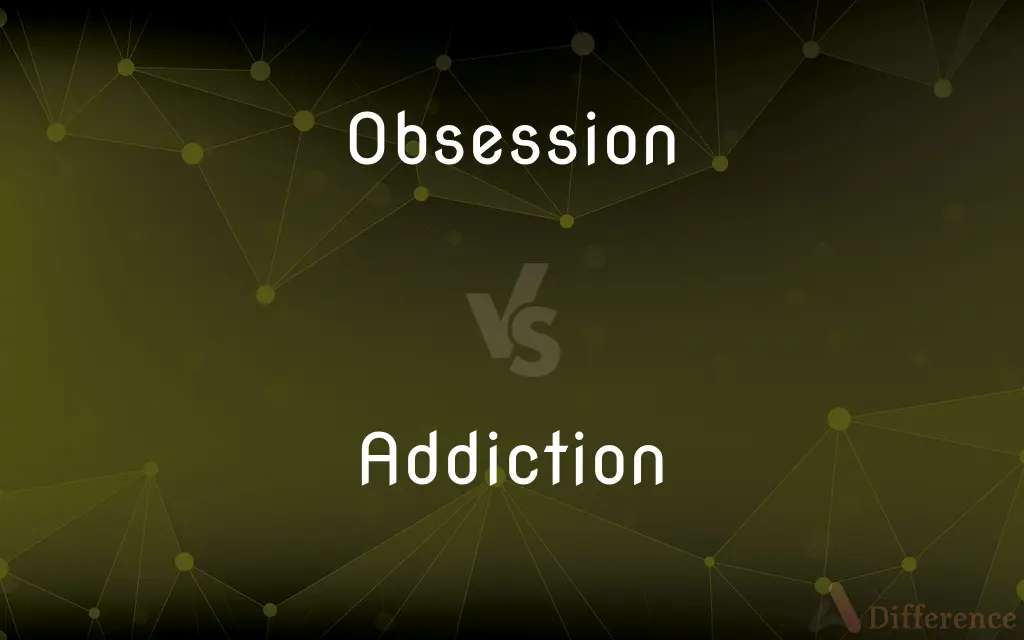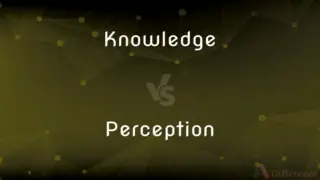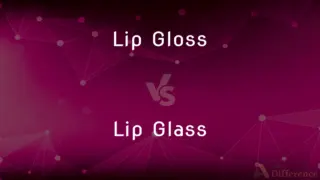Obsession vs. Addiction — What's the Difference?
Edited by Tayyaba Rehman — By Urooj Arif — Published on July 7, 2024
Obsession involves persistent, intrusive thoughts, focusing on specific ideas or tasks, whereas addiction entails a physical or psychological dependence on substances or behaviors.

Difference Between Obsession and Addiction
Table of Contents
ADVERTISEMENT
Key Differences
Obsession is characterized by recurring, unwelcome thoughts or images that dominate a person's mind, often leading to anxiety and distress. On the other hand, addiction is a compulsion towards a particular substance or activity, marked by the inability to stop despite harmful consequences.
While obsession primarily affects mental processes, causing individuals to dwell excessively on certain ideas or urges, addiction involves both psychological and sometimes physical elements, with individuals experiencing withdrawal symptoms if the substance or behavior is discontinued.
Obsessions can manifest in various forms, such as constant worries about cleanliness or an overwhelming focus on organization, without necessarily leading to physical withdrawal symptoms. Conversely, addictions, such as those to drugs, alcohol, or gambling, directly impact physical health and social functioning.
Treatment for obsession often involves cognitive-behavioral therapy (CBT) to manage intrusive thoughts and reduce anxiety. In contrast, addiction treatment may include detoxification, medication, therapy, and support groups to address both the physical and psychological aspects of the dependency.
Obsessions can be part of obsessive-compulsive disorder (OCD), a condition where they are coupled with compulsive behaviors aimed at reducing anxiety. Addiction, however, is recognized as a disorder in itself, where the substance or behavior becomes central to a person's life, often at the expense of health and relationships.
ADVERTISEMENT
Comparison Chart
Definition
Persistent, intrusive thoughts or impulses.
Compulsive need for and use of a substance or behavior.
Primary Impact
Mental and emotional.
Psychological and often physical.
Symptoms
Intrusive thoughts, anxiety, distress.
Cravings, withdrawal symptoms, neglect of responsibilities.
Examples
Excessive cleanliness, orderliness.
Drug, alcohol, gambling addictions.
Treatment
Cognitive-behavioral therapy, medication.
Detoxification, medication, therapy, support groups.
Compare with Definitions
Obsession
Associated with anxiety and stress.
Her obsession with making the right decision causes her significant anxiety.
Addiction
A physical or psychological dependence on a substance or activity.
His addiction to nicotine makes it hard to quit smoking.
Obsession
Mental condition characterized by repetitive thoughts.
Her obsession with perfection makes it hard to complete tasks.
Addiction
Treated through a combination of methods including detox and support groups.
Joining a support group has been crucial in his addiction recovery.
Obsession
Persistent thoughts or impulses that are unwanted and cause distress.
He has an obsession with germs, constantly washing his hands.
Addiction
Involves engaging in behavior despite negative consequences.
Despite losing her job, her addiction to gambling persists.
Obsession
Treated through therapy and sometimes medication.
Cognitive-behavioral therapy has helped him manage his obsessions.
Addiction
Can lead to withdrawal symptoms when stopped.
Stopping the drug led to severe withdrawal symptoms.
Obsession
Can occur without compulsive actions.
His obsession with order doesn’t always lead to organizing.
Addiction
Affects various aspects of life, including health and relationships.
Her alcohol addiction has strained many family relationships.
Obsession
A compulsive, often unreasonable idea or emotion.
Addiction
A condition involving use of a substance, such as a drug or alcohol, or engagement in a behavior, such as gambling, in which a person has strong cravings, is unable to stop or limit the activity, continues the activity despite harmful consequences, and experiences distress upon discontinuance
A drug used in the treatment of heroin addiction.
Obsession
(Psychiatry) A pattern of unwanted or intrusive thoughts or urges that recur persistently, often accompanied by symptoms of anxiety.
Addiction
The condition of being habitually occupied with or involved in something
Addiction to romance novels.
Obsession
The quality of being obsessed.
Addiction
The condition of using something on a regular or dependent basis
Fossil fuel addiction.
Obsession
An idea that engenders a compulsive or irrational preoccupation, or the preoccupation thereby engendered.
Addiction
An instance of one of these conditions
Had an addiction to fast cars.
Obsession
An activity or entity that inspires a compulsive and potentially unhealthy fixation, or the fixation thereby inspired.
Editing Wikipedia started as a hobby, but it's turned into a complete obsession of mine.
Addiction
(medicine) A state that is characterized by compulsive drug use or compulsive engagement in rewarding behavior, despite negative consequences.
Obsession
Influence or control by evil spirits without possession.
Addiction
The state of being addicted; devotion; inclination.
Obsession
The act of besieging.
Addiction
A habit or practice that damages, jeopardizes or shortens one's life but when ceased causes trauma.
Obsession
The state of being besieged; - used specifically of a person beset by a spirit from without.
Whether by obsession or possession, I will not determine.
Addiction
A pathological relationship to mood altering experience that has life damaging consequences.
Obsession
An excessive preoccupation of the thoughts or feelings; the persistent haunting or domination of the mind by a particular desire, idea, or image.
Addiction
The state of being addicted; devotion; inclination.
Obsession
Any driving motive; a compelling goal; - not necessarily implying a negative judgment, as does sense 3; as, the coach was obsessed with winning the state championship
Addiction
Being abnormally tolerant to and dependent on something that is psychologically or physically habit-forming (especially alcohol or narcotic drugs)
Obsession
Something that causes an obsession{3}.
Addiction
An abnormally strong craving
Obsession
The state of being obsessed.
Addiction
(Roman law) a formal award by a court sentence of a thing or person to another (as of a debtor to his creditor); a surrender to a master;
Under Roman law addiction was the justification for slavery
Obsession
An irrational motive for performing trivial or repetitive actions against your will
Obsession
An unhealthy and compulsive preoccupation with something or someone
Common Curiosities
Can someone have an obsession and an addiction at the same time?
Yes, individuals can experience both simultaneously, with each condition potentially exacerbating the other.
Is treatment for obsession and addiction the same?
Treatments differ; obsession is often treated with therapy, while addiction may require detox, medication, and support groups.
How can family members help someone with an obsession or addiction?
Offering support, understanding, and encouraging treatment are critical steps in helping loved ones.
Are obsessions always negative?
While not always harmful, obsessions are intrusive and distressing, often impacting well-being negatively.
How do you know if you have an obsession or an addiction?
If thoughts or impulses dominate your mind causing distress, it might be an obsession. If there’s a compulsion to use a substance or engage in behavior despite harm, it’s likely an addiction.
Can obsessions lead to addictions?
Obsessive behaviors can sometimes evolve into addictions, especially if the behavior is used as a coping mechanism.
Are there genetic factors involved in obsession and addiction?
Both conditions can have genetic predispositions, making some individuals more susceptible than others.
What distinguishes an obsession from an addiction?
An obsession is a mental fixation on specific thoughts or tasks, while addiction is a dependency on substances or behaviors.
Can lifestyle changes help with obsession and addiction?
While lifestyle changes alone may not cure these conditions, they can be beneficial as part of a comprehensive treatment plan.
Can addictions be without substances?
Yes, addictions can also involve behaviors, such as gambling or internet use, not just substances like drugs or alcohol.
Can children develop obsessions or addictions?
Yes, both conditions can manifest in childhood, requiring early intervention.
What is the success rate of treatment for obsession and addiction?
Success rates vary, with factors including the individual’s commitment to treatment and the severity of the condition playing roles.
Does having an obsession or addiction mean you are mentally ill?
These conditions are recognized mental health disorders, requiring professional diagnosis and treatment.
Is medication always required for treating these conditions?
Not always; the necessity of medication depends on the individual's condition and severity.
Can obsessions or addictions be completely cured?
While complete cure may not always be possible, effective management and significant improvement in symptoms are achievable with proper treatment.
Share Your Discovery

Previous Comparison
Knowledge vs. Perception
Next Comparison
Lip Gloss vs. Lip GlassAuthor Spotlight
Written by
Urooj ArifUrooj is a skilled content writer at Ask Difference, known for her exceptional ability to simplify complex topics into engaging and informative content. With a passion for research and a flair for clear, concise writing, she consistently delivers articles that resonate with our diverse audience.
Edited by
Tayyaba RehmanTayyaba Rehman is a distinguished writer, currently serving as a primary contributor to askdifference.com. As a researcher in semantics and etymology, Tayyaba's passion for the complexity of languages and their distinctions has found a perfect home on the platform. Tayyaba delves into the intricacies of language, distinguishing between commonly confused words and phrases, thereby providing clarity for readers worldwide.












































